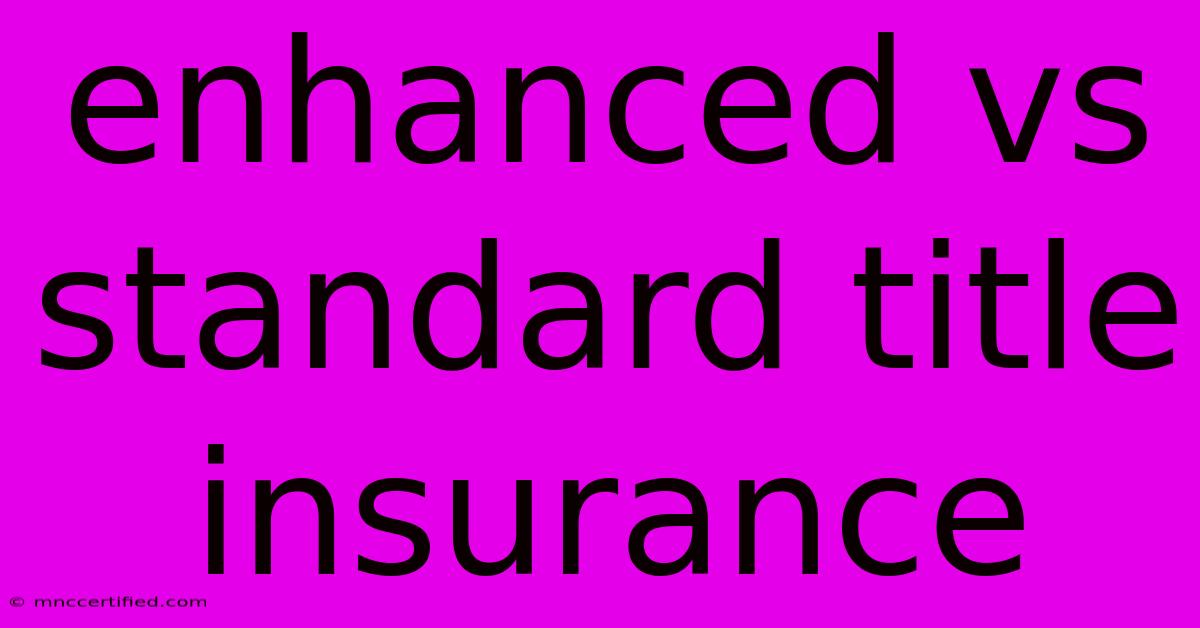Enhanced Vs Standard Title Insurance

Table of Contents
Enhanced vs. Standard Title Insurance: Which One Do You Need?
Buying a home is a significant financial decision, and protecting your investment is crucial. Title insurance plays a vital role in safeguarding your ownership rights, but understanding the different types of coverage can feel overwhelming. Today, we'll delve into the key differences between standard title insurance and enhanced title insurance, helping you determine which option best suits your needs.
What is Title Insurance?
Before we dive into the differences, let's define what title insurance is and why it's essential. Title insurance is a policy that protects you against financial losses arising from defects or encumbrances on your property's title. These defects can range from unpaid property taxes and liens to errors in previous property transfers.
Essentially, title insurance acts as a safety net, ensuring you have a clear and marketable title to your property.
Standard Title Insurance: The Basics
Standard title insurance, also known as owner's policy, is the most common type of title insurance. It provides coverage against title defects that existed before you purchased the property. This includes issues like:
- Forged documents: Someone fraudulently signed documents related to the property's ownership.
- Unpaid taxes or liens: Previous owners failed to pay property taxes or outstanding debts, leaving a lien on the property.
- Mistakes in public records: Errors in land records might show incorrect ownership or boundaries.
- Unrecorded interests: Hidden claims or rights that were not properly documented.
Standard title insurance generally protects you from financial losses resulting from these defects. It also covers the costs of legal defense if someone challenges your ownership rights.
Enhanced Title Insurance: Extra Protection
Enhanced title insurance, also known as extended coverage title insurance, goes beyond the protection offered by standard insurance. It provides coverage for title defects that may arise after you purchase the property. These can include:
- Errors made during the title search: The title company might miss a crucial document or record, leading to future problems.
- New claims or liens: New debts or encumbrances could be placed on your property after you acquire it.
- Fraudulent transfers: Someone might try to fraudulently transfer ownership of the property to another individual.
Enhanced title insurance offers additional peace of mind by protecting you against these potential future issues. This extended coverage can be particularly beneficial in situations like:
- Newly developed areas: New construction or changes in the neighborhood can create unexpected claims.
- Complex property ownership: If the property has multiple owners or shared interests, the risk of future title issues increases.
- Properties with a history of legal disputes: Past legal battles or unresolved ownership issues could lead to future complications.
Choosing the Right Title Insurance for You
Choosing between standard and enhanced title insurance depends on your specific needs and risk tolerance. Here's a quick guide to help you decide:
Standard title insurance is a good choice if:
- You are buying a property in a well-established area with a clear history.
- You have a relatively simple property with no unusual ownership structures.
- You are on a tight budget and want to keep costs down.
Enhanced title insurance is recommended if:
- You are buying a property in a newly developed area or a location with a complex past.
- You have a unique property with multiple owners or shared interests.
- You want the most comprehensive protection against potential future issues.
Consult with a Title Insurance Professional
Ultimately, the best way to determine the right title insurance for you is to consult with a qualified title insurance professional. They can assess your specific situation and recommend the appropriate coverage level based on your individual needs and the characteristics of your property.
Remember, title insurance is a critical investment that can save you from significant financial headaches in the future. By understanding the differences between standard and enhanced coverage, you can make an informed decision that protects your investment and ensures a smooth and secure homeownership experience.

Thank you for visiting our website wich cover about Enhanced Vs Standard Title Insurance. We hope the information provided has been useful to you. Feel free to contact us if you have any questions or need further assistance. See you next time and dont miss to bookmark.
Featured Posts
-
Vikings Win Week 10 Report Card Grades
Nov 11, 2024
-
Trump Victory Fuels Bitcoin To 80 000 High
Nov 11, 2024
-
Where To Watch Jets Vs Cardinals Live Stream
Nov 11, 2024
-
Scotland Vs Springboks 5 Post Match Insights
Nov 11, 2024
-
49ers Edge Out Bucs In Close 23 20 Win
Nov 11, 2024